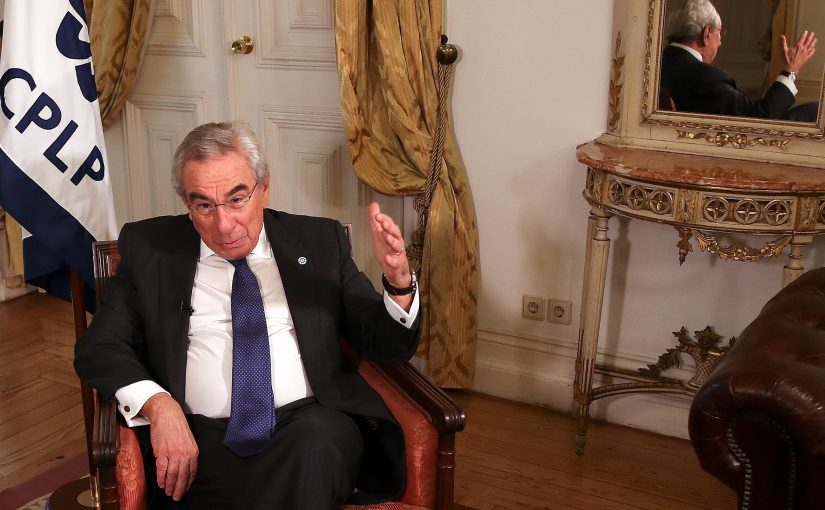Brazil central bank to sign currency swap deal with China's PBOC
CPLP: Executive secretary aims to boost ties with EU in last six months in post

Photo: Lusa
The executive secretary of the Community of Portuguese-Language Countries (CPLP) has said that one of his goals in his remaining six months in office is to strengthen the organisation’s relations with the European Union.
“What I wanted in these last six months is to take advantage of the Portuguese presidency of the [Council of the] European Union so that it can help strengthen the EU’s relations with the CPLP,” said Francisco Ribeiro Telles, a career diplomat from Portugal, in an interview with Lusa on Sunday, two years to the day after he took office.
According to Telles, there is a will on both sides to strengthen ties between the EU and CPLP.
“The EU is increasingly interested in having a significant focus on Africa, and that focus can also go through the CPLP,” he said.
An institutional relationship between the two organisations would, he argued, be useful for the EU and very useful for the CPLP for aid and development.
One of the goals set out by Telles at the beginning of his term was to bring the CPLP closer to other international organisations.
In an interview with Lusa before he formally took office two years ago, Telles said that his idea was to establish partnerships with other regional organisations that could be useful to the CPLP. He particularly mentioned the EU and the African Development Bank (AfDB), arguing that the CPLP could compete for international projects to which the EU and AfDB make financial contributions.
In this latest interview, he recalled that the CPLP this year signed a memorandum for future cooperation with the Organisation for Economic Cooperation and Development (OECD) and now has an increasingly close relationship with the Ibero-American General Secretariat (SEGIB), that is, with the countries of Latin America, as well as with the OEI – Organisation of Ibero-American States.
The OEI is already an associate observer at the CPLP, and the latter is now moving forward with the process of becoming an advisory observer to the OEI – a move that has already been given the green light by its own Permanent Consultative Committee, the gathering of the ambassadors representing the CPLP’s nine member states in Lisbon.
According to Telles, the partnership with SEGIB is very important because two CPLP members – Brazil and Portugal – are also in that organisation, and there are Latin American countries that are part of SEGIB that are already associate observers at the CPLP and others that are planning to join.
Another aspect Telles highlights of the work carried out during his term is the CPLP’s ever-closer approach to citizens, with the plans for free movement, a good part of which was approved at last Wednesday’s ministerial meeting.
“An excellent work of the presidency of Cabo Verde,” said Telles of the project, adding that it would be “a historic milestone” if the final text is approved at next year’s planned summit of heads of state and government in Luanda.
He also noted growing international interest in the CPLP on the part of other countries, citing states that in the last two years have submitted expressions of interest or have already submitted their bids to be associate observers of the organisation.
With the states whose bids are due to go to the Luanda summit for approval, the CPLP should soon have 31 associates, up from the current 18 countries and one organisation (the OEI).
This is happening, according to Telles, because the CPLP is a unique and irreplaceable organisation, present on all four continents and with a very important future ahead of it.
Of the work of the executive secretariat in the past two years, Telles recalled the approval of a new CPLP headquarters agreement at last Wednesday’s meeting of ministers; this allows the organisation to have rights and duties equal to those of other international organisations based in Portugal, a long-standing demand.
Telles’s term as head of the executive secretariat of the CPLP was to end on 31 December this year, but he accepted member states’ request that it be extended until July next year.
The summit, which had been scheduled to take place in September, was also postponed until 2021 at the request of Angola, the host nation, because of the Covid-19 pandemic, among other reasons.
Angola is thus in July next year to take over the presidency of the CPLP from Cabo Verde – which also agreed to extend its mandate for a further year – while Zacarias da Costa, a former foreign minister of East Timor, is expected to be approved as the new executive secretary.
The CPLP has nine member states: Angola, Brazil, Cabo Verde, Equatorial Guinea, Guinea-Bissau, Mozambique, Portugal, Sao Tome and Principe and East Timor.













Leave a Reply
Be the First to Comment!
You must be logged in to post a comment.
You must be logged in to post a comment.